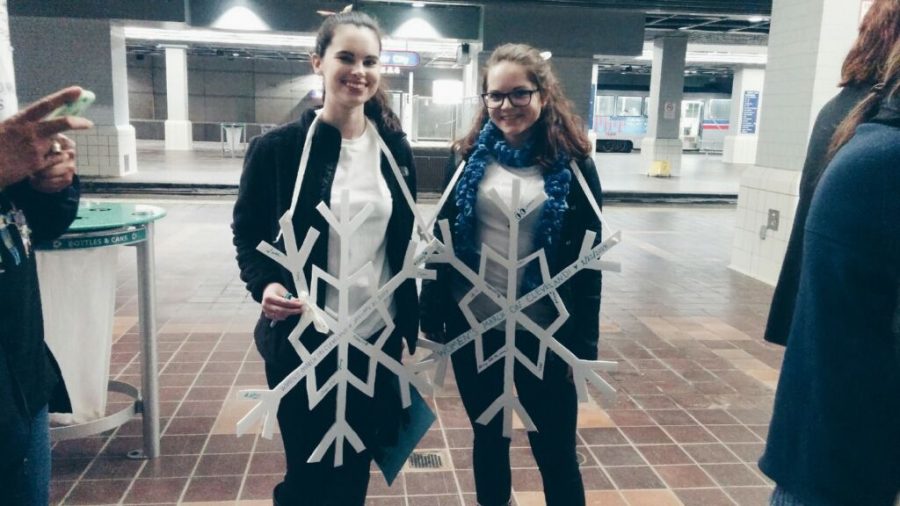Waiting at Green Road Station: The Cleveland Women’s March
Kent State senior digital media production major Erica Collins and junior psychology major Kelsy Henderson wait for a train at the Public Square Station in Cleveland, Ohio on Saturday, Jan. 21, 2017.
Walking up to the Green Road RTA station in Shaker Heights, Ohio, an unusually large crowd stands lined up, ready to board the next train.
Various members are waiting – not so patiently – with handmade signs in hand, already brandishing them in the air. They’re ready to march with thousands of others set to gather in downtown Cleveland’s Public Square for the city’s sister march to the Women’s March on Washington.
Sprinkled throughout the line are protesters donning bright pink caps with cat ears attached at the top – “Pussyhats” as they’ve come to be known. The hats have become a symbol of solidarity for all supporters and participants in the Women’s Marches across the country.
“We found out about the hats from our friend … and I crochet blankets and different things and found this pattern from the website pussyhatproject.com,” said Chesterland resident Heidi Kollmorgen. “We’re ready to go downtown and do our thing.”
Standing further down the line is 32-year-old Cleveland resident Anthony Leanza. Being one of the few men at the Green Road station has already made him stand out. But there’s a reason he’s getting near constant requests for pictures: his sign that reads “Men of quality respect women’s equality.”
“I’m just here to support my girlfriend and other women in my family,” Leanza said. “I don’t think it has anything to do with gender at all. Everybody’s the same. Why wouldn’t (men) support (the Women’s March)?”
When a train pulls up to the platform, half of the line excitedly squeezes into the car. Some are even asked to get off by an RTA employee because of overcapacity. Despite the crowds, there’s still a positive energy in the air. As the train pulls off, the passengers cheer and those left behind cheer along with them, sending them off with a wave as they wait for the next ride.
Two of the people who didn’t make it on the train are Kent State students Erica Collins and Kelsy Henderson. The two are standing on the station platform with giant snowflakes hanging around their necks. The girls were up until 5 a.m. making the snowflakes the night before, using an X-Acto knife and foam boards.
“We decided to dress up as snowflakes, and the back of our T-shirts say ‘proud snowflake,’” said Collins, a senior digital media production major. “It’s kind of a reference to Tomi Lahren’s video when she’s, you know, calling democrats snowflakes and … basically saying that they’re fragile, oversensitive and that feelings don’t matter. Like a little nod to her.”
Both are attending the Women’s March as a protest of the election of President Donald Trump.
“I’m here because I believe in equality for everyone,” said Henderson, a junior psychology major. “And I do not believe that our president deserves the position that he’s been given.”
Cleveland Heights resident Jackie Larkins is also staunchly unsupportive of the president. Larkins was an avid supporter of Democratic candidate Hillary Clinton. Larkins’ coffee shop, Coffee Phix Cafe in South Euclid, was a call center for the Clinton campaign, and Larkins also participated in an online commercial for small businesses for the campaign.
However, the highlight of her advocacy was introducing President Barack Obama during his Oct. 14, 2016 visit to Cleveland.
“I got to spend about five minutes alone with him before I went out to do the introduction,” Larkins said. “To be honest with you, it’s like a surreal experience. I don’t remember a lot of it. I was very much in awe from his presence … but it’s something that I will cherish.”
Now, following Clinton’s loss in November and the recent end of the Obama Administration, the Women’s March in Cleveland was Larkins’ way of taking a stand.
“This is what I can do. I can do very little, but this is what I can do and why I’m here,” she said.
When the next train arrived, another wave of people were finally able to board.
Stacy Sherman, a 55-year-old Solon resident, was lucky enough to get a seat on the congested train car. She was attending the march with a group of friends and her daughter, a junior at Orange High School.
Sherman said she was in awe of the crowds that turned out nationally for the Women’s March. She remembered her days of protesting when she attended Michigan State University in the early ’80s; a place where she “got feminized and maybe a little bit radicalized.”
“I can’t remember an outpouring like this on a national level where we have so many cities,” she said. “I did take back the night marches on campus. Those were about rape and reproductive rights. Things like that. But maybe there would be a couple hundred that would come out. But I think there’s a couple hundred on this subway – the RTA – right now.”
As the train got closer to Public Square, Sherman expressed her idea on the importance of the Women’s March.
“We have to be the change we wanna see. We don’t have the luxury of sitting home … we have to send a message. They call it ‘praying with your feet.’ Marching with your feet.”
McKenzie Jean-Philippe is the diversity editor, contact her at [email protected].



